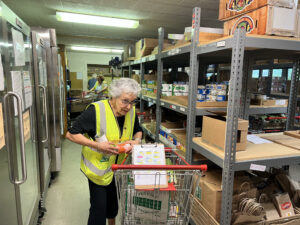Inflation bites during this era of Bidenomics. And poor families are the ones being bitten.
A recent study showed that for those households that used the Supplemental Nutrition Assistance Program’s (SNAP) increased pandemic benefits, 43 percent skipped meals last month, and 55 percent ate less because they couldn’t afford food. According to a report from Propel Inc., that was more than double last year’s rate.
Also, more households had utilities shut off or could not pay their rent.
Those households receiving SNAP are at or below the federal poverty line of $30,000 annually for a family of four.
According to the U.S. Census, real median post-tax household income in 2022 was 8.8 percent lower than in 2021.
The Census reports the poorest areas of the Delaware Valley include the city of Chester, Darby Borough and Darby Township, Sharon Hill, and Colwyn in Delaware County; parts of West Chester and Coatesville in Chester County; and Norristown and Pottstown in Montgomery County.
Liz Hagedorn, director of Nutritional Development Services, which is affiliated with the Archdioceses of Philadelphia, agreed inflation drives the need for more people to ask for help. Her organization sponsors 50 food cupboards in the five-county area.

Nicolino Ellis welcomes clients to the Jenkintown Food Cupboard.
“We are seeing the cost of not only food but also utilities and other items that families need just to get by have all gone up tremendously,” said Hagedorn. “And very few of those items have come back down in price. And we are seeing an increase at the food cupboards and people in the street, as well, coming in for more food.”
Nicolino Ellis, director of the Jenkintown Food Cupboard at the United Methodist Church, said he sees more people signing up for food.
As of Sept. 1, 2022, the church had 275 new families as clients. It has 382 new families this year, “over a third increase,” he noted.
And in August 2022, it had 870 visits (some families made multiple visits). This year, there were 1,165 visits to the food cupboard.
“That’s a massive increase,” he said. Inflation is partly to blame based on the increase of elderly people on fixed incomes who are coming in for food, he explained. They also have more Ukrainian refugees: 50 of 65 families who recently signed up are Ukrainian refugees “who had never been here before,” said Ellis, who greets clients as they drive in and seems to know everyone’s name.
“Last month, there were 76 new families,” said Ellis. “That’s a really high number.” In 2022, about 20 families a month signed up, he said.
Last Thursday, a steady stream of people drove up to get their food allocation. The food cupboard also offers personal care items and baby care needs like shampoo and diapers.

Jenkintown Food Cupboard volunteer Bess Kaufman fills a cart for a client.
Volunteers act as personal shoppers and fulfill the clients’ lists. They know their likes and dislikes. The food cupboard has 175 volunteers with 70 alternating weeks.
Ellis pointed out that giving fish to someone who does not like fish would be wasteful.
“We’re trying to eliminate some of the stigma of being food insecure,” he said. They also have a fund to help smaller food pantries in the area supply fresh food, not just “shelf staples.”
The food cupboard offers fresh fruits and vegetables, milk and almond milk, eggs, various kinds of meat, and staples like rice and pasta. It has storage rooms in the building it rents from the church with shelving and refrigerators. It is raising money for a warehouse, he said. However, it will keep the present site for clients to pick up their supplies.
About a third of the food cupboard’s money comes from federal funds through the state and county, with the remainder from donations. Many religious institutions and schools collect food for it. Food is collected through Philabundance and the Share Food Program, and fresh produce is purchased from a distributor.
“Last year, we gave away almost a half million pounds of food,” he said.
Hagedorn thinks more people will feel the pinch in October when they must begin repaying their student loans.
“I think a lot of young people and older people are going to feel that squeeze in their budget, as well,” said Hagedorn.
“They’re saying the inflation rate has gone down,” she said. “That it’s more manageable. But I don’t see it. I mean, I know from my own personal experience when you go food shopping, have you seen the price of anything go down? No. I’m thinking, where are these people (who say that) shopping?”
More people are reaching out for help, she said.
“You know what Jesus said, ‘Everyone is your neighbor.’ So that’s what we do,” said Hagedorn.

